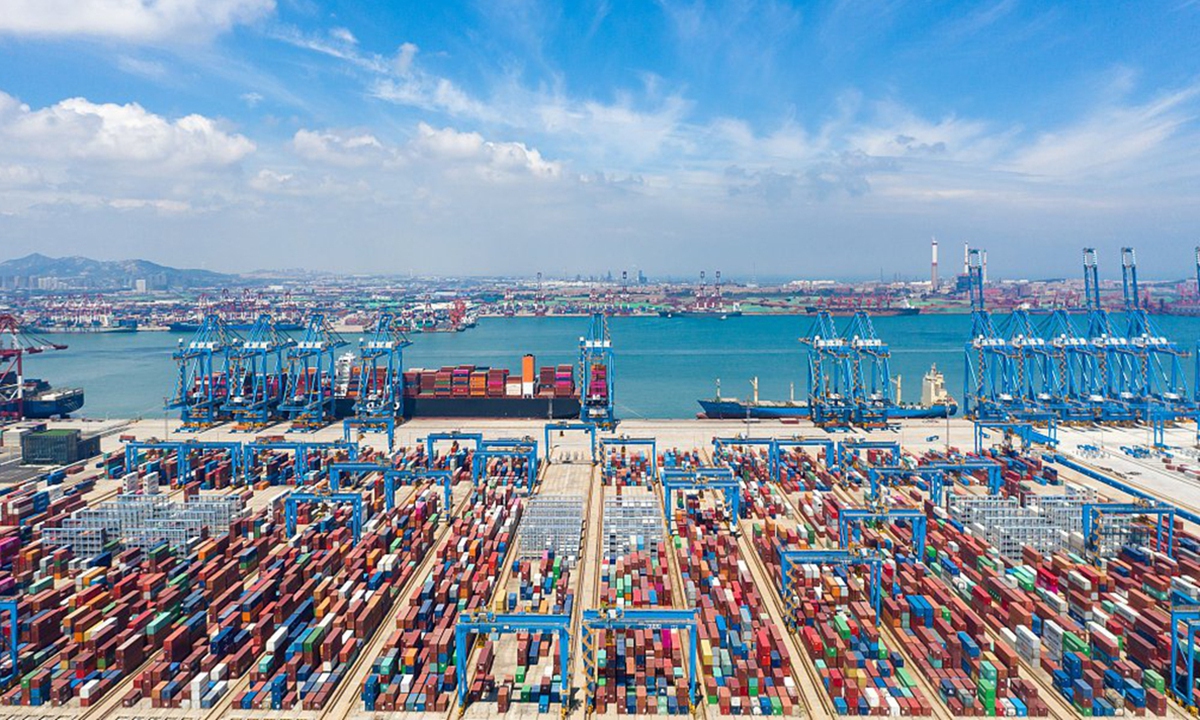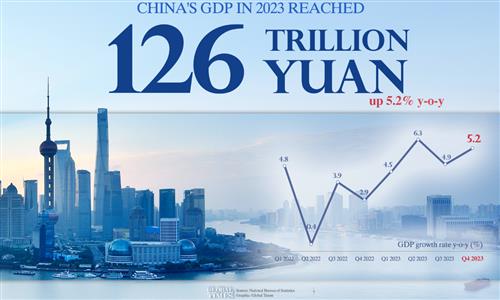
China trade economy File photo: VCG
China's economic data for 2023, including a 5.2-percent GDP growth, continue to reverberate across the globe, with businesses, economists and media pundits around the world assessing the performance of the world's second-largest economy and its global implications.
Overwhelmingly, many global economic leaders, businesses and experts are encouraged by China's strong growth and are upbeat about its continued recovery and contribution to global growth in 2024 and beyond. However, many Western media outlets continued to paint a gloomy outlook for China's economy, with cliché narratives such as "peak China."
These strikingly different reactions also captured the increasingly complex dynamic for the Chinese economy. On the one hand, it is steadily recovering from the three-year pandemic, becoming healthier, creating more opportunities for global businesses and contributing more to global growth; but on the other hand, it is also facing challenges, including weakening expectations and growing geo-economic hostility due in no small part to Western media's relentless smearing campaign.
Under this complex situation, Chinese policymakers have adopted an approach of "seeking progress while maintaining stability," under which targeted policies, instead of broad-based stimulus that are seen in many economies, to stabilize growth, while also focusing on tackling risks and industrial upgrade. With these targeted policies, the Chinese economy will not only recover in quantity but also improve in quality, which will bode well for global growth, economists said.
Strong performance
China on Wednesday released a series of economic data for 2023, and revealed a GDP growth rate of 5.2 percent. From many perspectives, the growth rate is solid considering all the challenges. It's higher than the official growth target of around 5 percent and a sharp increase from 2022's growth rate of 3 percent. It means China's growth rate outpaced that of the advanced economies.
"The 5.2 percent growth figure for China's economy in 2023 is a strong number, given the size of the Chinese economy, its state of development and the weak outlook for global growth," Gary Hufbauer, a non-resident senior fellow at US think tank Peterson Institute for International Economics, told the Global Times. "I sharply disagree with critics who say the Chinese economy is stumbling."
Hufbauer's assessment is also shared by many global economic leaders and businesses at the World Economic Forum (WEF) annual meeting in Davos, Switzerland.
"The Chinese economy met the national target, which was set at around 5 percent, and actually exceeded it. That is good news for China and also good news for Asia and the world because China delivers one-third of global growth," Kristalina GeorgievaKristalina, managing director of the International Monetary Fund (IMF) told Xinhua News Agency in Davos.
The IMF has projected that China would have contributed one-third of global growth in 2023. Additionally, China's faster growth also has positive spillovers on the rest of the world, Steven Alan Barnett, senior IMF resident representative in China, told the Global Times in a recent interview.
"For example, a 1 percentage point increase in growth in China would, on average, increase the level of output in other economies by 0.3 percent over the medium term. This illustrates how strong growth in China is good for China while also providing a welcome lift to global demand," Barnett said.
In China, the 5.2-percent growth rate also offered much-needed reassurance over the health of the Chinese economy, after fluctuations in some economic indexes throughout the year hurt expectations, economists said.
"Year 2023's growth rate of 5.2 percent actually gave everyone a reassurance, because various 'China collapse' narratives emerged after the economy slowed in the second quarter and foreign trade declined in the second and third quarters," Cao Heping, a professor of economics at Peking University, told the Global Times on Thursday.
Foreign doomsayers
These negative narratives about the Chinese economy continued to appear in Western media outlets, even after China posted what both Chinese and foreign economists call "strong" growth for 2023.
Notably, The Economist apparently tried to re-promote the "peak China" narrative, which it championed in 2023 but was widely rejected by many global economists. "The 'peak China' narrative is proving difficult to shift," it declared in an article on Wednesday, which converted China's GDP into US dollars, which surged sharply due to US rate hikes and high inflation, and concluded that China's GDP actually shrank in 2023, in an apparent bid to support its narrative.
Meanwhile, Reuters, based on interviews with some Chinese people who were identified by English first names, claimed that China's economy "feels like it is in recession," in an article on Thursday.
"All these narratives are made up by people like Gordon Chang who sit in their offices overseas and act as if they know China's problems better than we Chinese do. It's basically nonsense," Cao said, referring to a US media pundit who predicted China would collapse over a decade ago.
Chinese economists said that apart from their ideological bias toward China, many Western pundits also rely on outdated indexes and models to analyze a rapidly shifting Chinese economy, and as a result, they often exaggerate China's problems and overlook China's new growth points.
"We should look at foreign media reports objectively. However, we cannot be manipulated by them when they focus only on one side of the problem," He Weiwen, senior fellow from the Center for China and Globalization, told the Global Times on Thursday.
He noted that geopolitical tensions and economic fragmentation caused by the West were huge challenges for China and the global economy in 2023, "but [foreign media] don't see how that's a big problem."
Despite all the challenges, including the US-led ever escalating campaign to contain China's development, China's economy continued to grow in size and improve in quality, which actually reflects its resilience and boosts confidence in its prospect, economists said.
Many global experts remain upbeat on China's growth outlook. "The world economy depends on strong Chinese growth, and that looks assured for 2024," Hufbauer said.
Global businesses also continued to expand in China in a vote of confidence. Yin Zheng, executive vice president of China & East Asia Operations at French multinational firm Schneider Electric, said that China is the company's second largest market worldwide and the company completed several major projects in China just last year.
In 2024, "we will work with Chinese partners to jointly enhance the overall competitiveness and influence of the industrial chain and help China accelerate the realization of high-quality development and 'dual carbon goals,'" Yin said in a statement to the Global Times on Thursday.
Tu Lei also contributed to this report.


